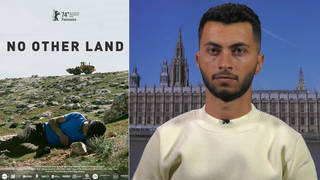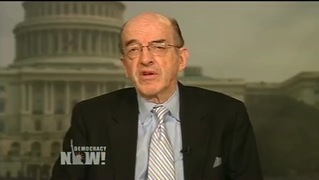
Topics
Guests
- Michael Coppsmember of the Federal Communications Commission from May 2001 to December 2011. He is the longest-serving FCC commissioner in the agency’s history. He now leads the Media and Democracy Reform Initiative at Common Cause. He recently co-authored a piece titled “Why Is the FCC Fighting the Coalition of the Ascendant?”
Former Federal Communications Commission Chair Michael Copps joins to discuss the growing opposition to the FCC’s effort to weaken media ownership rules and clear the way for greater media consolidation. Last month, Federal Communications Commission Chair Julius Genachowski circulated a plan to relax a longstanding ban that prevents the owner of a television broadcast station from also owning a newspaper in the same town or city. The move has drawn harsh criticism from public interest groups and lawmakers. Copps, who was the longest-serving FCC commissioner in the agency’s history, now leads the Media and Democracy Reform Initiative at Common Cause. [includes rush transcript]
Transcript
JUAN GONZÁLEZ: Well, we’re staying in Washington, D.C., and turning to a controversial proposal to weaken media ownership rules and clear the way for greater media consolidation. Last month, the Federal Communications Commission’s chair, Julius Genachowski, circulated a plan to relax a longstanding ban that prevents the owner of a television broadcast station from also owning a newspaper in the same town or city. Genachowski called for a vote to, quote, “streamline and modernize media ownership rules, including eliminating outdated prohibitions on newspaper-radio and TV-radio cross-ownership.” The move has drawn harsh criticism from public interest groups and lawmakers. This is Democratic Senator Maria Cantwell of Washington speaking last week.
SEN. MARIA CANTWELL: We are concerned about the proposed rule that has been circulated to streamline and modernize the media ownership rules. And this comes at a time when a report detailing the shockingly low number of media outlets run by women and minorities. A rule that makes it easier for corporations to control more media voices will not increase the diversity in the marketplace. And unfortunately, the draft rule was circulated behind closed doors. The commission should hold firm to ensure that this rule won’t get a majority if it’s voted on. This is a road we’ve been down before. In 2007, former Chairman Kevin Martin tried to push through similar rules, and we stopped them in their tracks by making sure that we passed a resolution of disapproval. And that resolution passed in 2008 and then went on with a court decision. So I am confident that we will push forward in Congress to do the same thing again.
AMY GOODMAN: That was Washington Senator Maria Cantwell. She promised to introduce legislation overturning the proposed changes, if they’re approved. Cantwell is one of at least a dozen senators who have have written to the FCC calling for a stop to their rule changes. On Monday, 44 members of the House, including Congressional Black Caucus chair, Congressmember Emanuel Cleaver, and Congressional Hispanic Caucus chair, Congressman Charles Gonzalez, sent a similar letter. And on Wednesday, the media justice group Free Press delivered more than 200,000 petition signatures opposing the rule changes. This is Carrie Biggs-Adams of Communication Workers of America.
CARRIE BIGGS-ADAMS: Hi. We’re back here in front of the FCC because they’re trying to consolidate media once again, and we don’t think it should happen. The public doesn’t think it should happen. Three million people have told them in the last 10 years that that shouldn’t happen. And it shouldn’t happen today in 2012, when Barack Obama, who opposed it as a candidate, is our president.
AMY GOODMAN: All of this comes as media mogul Rupert Murdoch has expressed interest in buying Los Angeles Times and Chicago Tribune newspapers, a move he can only take if the current media ownership rules are scrapped.
Well, for more, we are joined now by the former Federal Communications Commissioner Michael Copps, who was the longest-serving FCC commissioner in the agency’s history, from May 2001 to December 2011. He now leads the Media and Democracy Reform Initiative at Common Cause and recently co-authored a piece called “Why Is the FCC Fighting the Coalition of the Ascendant?”
Commissioner Copps, welcome back to Democracy Now! Explain what these rules are that the FCC is passing.
MICHAEL COPPS: Thanks for having me back.
Well, this is the story that never seems to go away, with the commission seeming bent always on loosening the media ownership rules. These are rules that limit how many outlets a particular company can own. And over the course of a generation, we have seen a few media behemoth’s gobble up independent local stations at great cost, I think, to localism and diversity, at great cost to the quality of our civic dialogue, and usually by a process that kind of mocks transparency and puts the cart ahead of the horse by voting on a document before the public has really been able to have a national conversation about it.
JUAN GONZÁLEZ: Well, Commissioner Copps, or former Commissioner Copps, this is now the third time this is being attempted. Two chairs of the commission under President Bush attempted to relax the cross-ownership rules, and now we’re seeing the Democratic chair, Genachowski, also doing the same thing. Why this persistence on attempting to eliminate the cross-ownership rules?
MICHAEL COPPS: Well, it’s depressing for me. I thought we would have made some changes, beginning in 2009, to reverse the ongoing trend toward media consolidation. You have to realize that through all these years while we’re debating these media ownership rules, the process of consolidation continues. Investigative journalism gets weaker and weaker. More and more reporters find themselves walking the streets looking for a job rather than walking the beats looking for a story. Glitzy infotainment seems to be substituting for real accountability, hold-the-powerful-accountable journalism. So, I mentioned before, we’re talking about the dumbing down of the civic dialogue, and an informed citizen really is the premise of self-government. And if we don’t have that kind of in-depth, resource-heavy journalism, we’re going to pay a heavy price in the quality of the decisions we make for our future, in a time that’s very, very challenging to the United States of America. We’ve got so many problems right now, there is no guarantee that America is going to come out of it all right. So we are seriously challenged, and if we starve that civic dialogue, we starve our national policy making, and we don’t do good things for the country.
JUAN GONZÁLEZ: Well, one of the things that occurred in previous efforts was that the federal courts overturned the efforts of the FCC, citing repeatedly the—or, the refusal of the FCC to address minority ownership in the broadcast industry and the impact of these rule changes. Yet, here again, we have Genachowski—once again, the FCC has not really addressed the issue of how will these rule changes affect the ability of African Americans or Latinos or women to own radio or television stations in the United States.
MICHAEL COPPS: This is really shocking, and it’s a national tragedy, really, in a country that is fast becoming one where a minorities—the minorities are going to be a majority. Racial minorities own 2.2 percent of full-power commercial television stations. Women own maybe on the order of 6 percent. I believe that diversity of viewpoint and diversity of programming all hinge on diversity of ownership. And if we allow this situation to perpetuate itself, we are really, I think, courting disaster. If you look at the results of the last election—I call it the rainbow election—it became clear that white males are no longer going to control the outcome of presidential elections, and then, increasingly, minorities are determined to have a role in the describing the destiny and defining the destiny of—of this country. It’s time to start delivering, not talking the talk, but walking the walk.
And one of the things that has surprised me most here is the fact that when President Obama was running for president back in 2007, 2008, he seemed to be exactly on my side of the equation. And I can read you a statement here, a very brief statement that he made, sent to a Chicago hearing that the FCC held. He said, “I believe that the nation’s media ownership rules remain necessary and are critical to the public interest. We should be doing [much] more to encourage diversity in the ownership of broadcast media, promote the development of new media outlets for expression of diverse viewpoints and establish greater clarity in the public-interest obligations of broadcasters.” If we had gone down that road, as I fully expected we would have gone down beginning in 2009, we would be in a much better place than we are right now, and we’d be playing offense and enhancing the quality of our civic dialogue, rather than playing defense and constantly having to ward off bad things happening. We’d be doing good things, instead, for minorities, for women, for diversity, for the civic dialogue.
AMY GOODMAN: So what happened? Julius Genachowski, the head of the FCC, is a close personal friend of President Obama.
MICHAEL COPPS: Well, you’d have to ask the commission. I think the commission has had different priorities. Good things have happened at the commission in other areas. This does not seem to be one of them, the public interest in broadcasting or the fate of minorities in our media. Perhaps they think that allowing some of these consolidations are good because some news is better than no news. But you have to realize that every time you approve one of these newspaper-broadcast cross-ownerships or radio-TV-broadcast ownerships, you’re losing a voice. You’re losing a voice in the locality. You’re losing diversity. You’re encouraging homogenized programming, homogenized news, homogenized music.
We have all of these tools right now of really making this a golden age in communications, and we’re not taking advantage of them. And I want to emphasize—and this is a very important point—we’re not just talking about traditional media of newspapers and radio and cable; we’re talking about the fate of the new media, too, the media of the Internet, which is showing very definite signs, I think, of traveling down the same road that every other communications infrastructure has traveled down over the generations, towards more consolidation, towards control by a few, towards rising prices, towards toll booths and gatekeepers. And if we allow broadband and the Internet, these fabulously opportunity-creating technologies, perhaps the most opportunity-creating in all of history, to go down that same road, and if we allow the Internet to become a cableized Internet, I think that would be a tragedy of historical proportions.
AMY GOODMAN: Let me ask you, Michael Copps, about the comment made by Owen Youngman, the Knight Chair in Digital Media Strategy at Medill University, formerly with the Chicago Tribune. He argues the FCC’s cross-ownership ban is, quote, “an artifact of an era of perceived scarcity of access to information for large swaths of the public.” Youngman says, “It’s still true that TV stations, radio stations and daily newspapers aggregate larger audiences within most of the top 20 markets than do other information sources that seek to compete directly with them. But it’s also true that those audiences are much smaller than before cable TV and the Web increased consumer choice so dramatically. … No media company is likely, ever again, to have more mindshare or influence than does Apple or Google or Facebook, none of which has any particular civic purpose at its core. While an end to the ban will not guarantee that media owners keep their communities’ interests front and center, removing the restriction is a worthwhile way to find out if whether a revised business and economic model can allow them a little more headroom to do so,” he says. Your response to this, Michael Copps?
MICHAEL COPPS: Well, we have—we have gone so far in the direction of removing restrictions. We don’t ask anything, for example, of broadcasters anymore. Our crisis, as I tried to explain, I think is a news-centric one. Why don’t we have, when a station comes in for a renewal of its broadcast license every eight years—it used to be three years, which I think was better—what they are doing to enhance the public dialogue, what they are doing to serve the public interest. What have they done to their news since they were last in for a license? We’ve got to start playing some offense. We have seen what happens with more and more consolidation. We’ve been through this for years and years. A merger seldom comes before the FCC that it doesn’t bless. So this is not just a shortfall of the private sector; it’s a shortfall of the public sector. Yes, the model of consolidation and the responding always to that quarterly report has been disastrous for the quality and the quantity of the news that people receive, but it’s also been highly, highly costly in just about every other way that you can think about.
JUAN GONZÁLEZ: And Michael Copps, what does this proposed rule change mean, for instance, for one of the world’s biggest media moguls, Rupert Murdoch and his News Corporation? Murdoch already, for instance, here in New York City, owns two television stations and two newspapers, the Wall Street Journal and the New York Post, and has already gotten a waiver here in the city, but he would like to also buy the Chicago Tribune and the L.A. Times, and there are also television and radio stations he owns, and the Tribune has its own—its own station already there.
MICHAEL COPPS: Well, I think it would be calamitous. And, you know, the broadcast industry would like us to believe that they have learned the lesson that consolidation—the era of consolidation was over, but yet we see all of this talk about where Murdoch is going to go. We saw the Comcast-NBCU merger. We saw Sinclair buying up all kind of stations. So we know that this is the road we’re on. And we know we have to do something about it if we’re going to reverse this trend and have a news and information infrastructure that really serves the needs of the American people in a difficult and challenging time.
AMY GOODMAN: Commissioner—
MICHAEL COPPS: So, the—
AMY GOODMAN: Commissioner Copps, we want to thank you very much for being with us, a member—longest-serving member of the FCC in its history, now working with Common Cause.
This is Democracy Now! When we come back, two peacemakers have returned from Afghanistan: former Colonel or retired Army Colonel Ann Wright and Reverend John Dear. We’ll speak with them.












Media Options